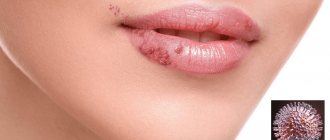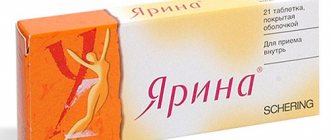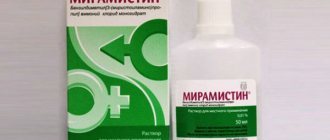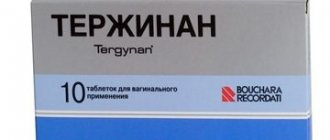Acyclovir for genital herpes is prescribed by specialists to suppress the activity of the herpes virus. It is this that causes the appearance of rashes in the genital area and other unpleasant symptoms. The herpes virus, having entered the body once, remains there forever, and with the help of modern medicines it will not be possible to get rid of it.
Features of herpes
According to WHO, more than 90% of the world's population is infected with the herpes virus. Among viral diseases, it holds unconditional primacy. Penetrating into human cells, the pathogen integrates into its DNA and then lives there. Scientists have not yet figured out how to remove herpes from cells.
With good immunity, the body binds it and keeps it in a latent (sleeping) state. When a person’s defenses weaken, herpes becomes more active, causing painful watery pimples on the face, body, genitals, chickenpox, shingles and other manifestations.
Use of Acyclovir
Acyclovir, unfortunately, cannot completely remove the virus. But he has the power to minimize its activity, avoid frequent recurrences of the disease, and also make the symptoms less noticeable.
This is an antiherpetic drug that has helped many patients cope with the disease. It reduces the number of skin rashes, ulcers from burst blisters dry out faster and crust over.
Acyclovir also dulls the pain that occurs due to the fact that the virus penetrates the nerve endings.
Acyclovir triphosphate replaces one of the rings in the DNA of the infection, thereby stopping its development and spread. For type 2 virus, it is more advisable to use the drug in tablets. It can also be in the form of an ointment or cream.
Once in the blood, the drug quickly spreads throughout the body. The medicine removes not only the external manifestations of herpes, but also acts at the cellular level.
Acyclovir prevents the formation of new bubbles and reduces pain. If you apply Acyclovir ointment to the rash, it will crust over and heal faster.
Signs of genital herpes
Genital herpes is caused by a type 2 virus. Its manifestations are similar to those on the nasolabial triangle:
- the occurrence of redness and pain at the site of pimple formation;
- painful watery pimples;
- the formation of crusts at the site of opened blisters;
- drying out of the pimple contents and secondary infection.
All symptoms occur in the groin area, on the labia majora and minora, sometimes on the edge of the cervix, the inner thighs, around the anus, and in men - on the penis, scrotum.
The acute form is accompanied by severe pain associated with unbearable itching and difficulty urinating.
Genital herpes is transmitted sexually and is considered the second most common among such diseases.
Other transfer methods include:
- from sick mother to child;
- during blood transfusion.
It is impossible to recover completely from the disease; frequent relapses provoke nervous disorders, disruption of the reproductive organs, diseases of the genitourinary system, even infertility and a complete lack of sexual desire.
Description
For genital herpes, the doctor may prescribe a medication such as Acyclovir. This drug has an antiviral effect against herpes and shingles viruses. Due to the constituent components of the drug, it prevents the proliferation of viruses. When Acyclovir is taken orally, the drug is partially absorbed, and it takes three hours to eliminate one-third of the drug dose. The constituent components of the drug are excreted through the kidneys and some of them in the form of a metabolite. If the patient has renal failure, the duration of drug removal increases to 20 hours.
The drug "Acyclovir", used against the herpes virus, prevents the formation of new pimples and their further spread throughout all areas of the skin. The medication prevents the development of possible complications from herpes on internal organs, accelerates the formation of crusts on the affected areas and reduces pain during exacerbation of the disease.
Acyclovir is prescribed to patients with weak immunity who have infections caused by the herpes virus type 1. A doctor may prescribe this drug for a primary sexually transmitted infection caused by a simple herpes virus. In some cases, Acyclovir is prescribed for prophylactic purposes against infections caused by herpes in patients with a malfunction of the immune system. In some cases, at the discretion of the doctor, the medication can be prescribed to the patient to strengthen the body's defenses.
Properties of the drug
Acyclovir is one of a limited number of drugs that can influence the development of viruses. It is effective against herpes and a few other viruses (it does not work against influenza and HIV). Its structure is similar to the components of human DNA that herpes uses to replicate. Having penetrated the DNA of the virus, it disrupts its division, which significantly slows down the process of formation of new molecules and stops reproduction.
Acyclovir has an analgesic effect. When taking the drug, pain decreases, old blisters dry out, and the formation of new ones is reduced. The exacerbation passes much faster.
Indications for use for herpes
For genital herpes, Acyclovir is indicated in tablets, ointments, and sometimes intravenously. The medicine relieves the symptoms and discomfort of the disease, and also promotes a speedy recovery of the patient. With the use of the product, small wounds and ulcers heal faster. In addition, by blocking the virus, new wounds do not appear, and the risk of complications and relapses is reduced. As a result of taking Acyclovir, herpes vulva goes away much faster and the disease returns less often.
In some cases, Acyclovir is prescribed intravenously:
- Herpes arose against the background of a serious disruption in the patient’s immune system;
- Secondary infection of the genital organs has occurred;
- The infection occurred after an internal organ transplant;
- There was a relapse of the disease;
- Herpes arose against the background of the congenital absence of an internal organ or part of the body;
- The disease was detected in a newborn;
- Herpes zoster, especially if patients are over 50 years of age. Most often, this form takes on a disease of the ear and eye localization;
- For the prevention of persons at high risk. For example, among those who are regularly exposed to the risk of infection or during the rehabilitation period after surgery.
In case of relapse, Acyclovir can be administered intravenously
Acyclovir quickly helps with any form of herpes, but the selection of the correct form and appropriate dosage of the drug should be entrusted to a specialist.
How to take Acyclovir
At one time, the creators of Acyclovir received the Nobel Prize for this discovery. Today, newer drugs have already been released, but Acyclovir remains the most effective for herpes.
The pharmaceutical industry produces medicine in several forms:
- Powder for injection (lyophilisate). It is used for large areas of damage, severe forms of the disease, and is also prescribed to newborns.
- Tablets of 200 mg and 400 mg. They are used in the treatment of genital herpes with Acyclovir.
- Eye ointment 3 percent in tubes of 4.5 g.
- Cream or ointment for external use, usually 5 percent, in 30 g tubes.
Prevention
To avoid infection (primary herpes), several rules must be followed:
- be careful during sexual intercourse and be sure to use contraception;
- do not use other people’s towels and other hygiene items;
- if you have herpes on the skin of your face, be careful with it and do not allow it to be transferred to the genitals;
- If herpes appears on your lips, refrain from sexual intercourse.
If you are already infected with herpes, it is important to avoid symptoms. This is very important before menstruation, when planning pregnancy and during lactation. At such times, the virus has a greater chance of manifesting itself as the immune system weakens.
To prevent relapse, take the following measures:
- Keep your immunity at a good level. This is true not only for herpes, but also for other diseases. Maintain a healthy lifestyle, eat right, take vitamins;
- Avoid stress. Nervous diseases often recur;
- Protect yourself during sexual intercourse. It is very important to avoid contracting other STDs.
If the number of relapses exceeds 5 times during the year, it is necessary to resort to suppressive therapy. This means that you need to take the drug daily for six months or even a year, 200 mg 4 times a day.
Remember that Acyclovir is not a universal remedy. This is a good antiviral drug, but it is better to consult a doctor before starting treatment. It is possible that your own diagnosis is inaccurate.
Treatment regimen
The treatment regimen for genital herpes depends on the form of the disease and the severity of its course.
General recommendations include:
- Take plenty of fluids during treatment with Acyclovir.
- Take the tablets after meals, this will reduce the load on the digestive tract.
- Take the medicine with clean, still water and non-acidic juices. Do not drink carbonated drinks. The amount of liquid you drink while taking the medicine should be at least 100 ml.
For severe forms the following is prescribed:
- intravenously, 10 mg of the drug per kilogram of weight, but not more than 1.5 g per day; administration every 8 hours for 10 days;
- lubricate skin rashes with cream for external use without affecting the mucous membranes.
In the acute stage, if blisters with the formation of crusts are observed, or at the initial appearance of rashes, the following is indicated:
- take 400 mg tablets, after 8 hours, 1 tablet, washed down with clean water in large volumes;
- lubricate the rash with 5% ointment; Do not apply ointment to mucous membranes;
- take ½ tablet (200 mg) every 4-5 hours (5 times/day) for large rashes.
The course of treatment for large rashes is 10 days, for small ones - 7.
To prevent relapses, Acyclovir is prescribed when itching and redness occurs (without waiting for pimples to form):
- Take ½ tablet (200 mg) after 8 hours.
- The area of redness is lubricated with ointment for external use.
Dosages are selected by the attending physician depending on the severity of the disease, age and condition of the patient.
Relapses
It is necessary to carry out additional therapeutic measures if genital herpes appears more than six times in one year. With frequent relapses, the doctor may increase the daily dose of Acyclovir to 1600 mg per day. In addition, the patient must adhere to the rules of a healthy diet, take a vitamin complex, and give up bad habits. During treatment, you should wear loose clothing made from natural materials. Antiseptic treatment of affected skin areas will prevent re-infection.
Contraindications and special instructions
There are contraindications for the treatment of genital herpes with Acyclovir:
- allergic reactions to the components of the drug;
- children up to 2 or 5 years of age (depending on the form);
- severe kidney pathologies;
- history of neurological diseases;
- dehydration (dehydration) at the time of treatment;
- lactation period (Acyclovir is found in breast milk).
It is known that Acyclovir crosses the placenta, but its effect on fetal development has not been studied, so use during pregnancy is indicated only if the expected positive effect outweighs the possible risks.
Side effects while taking Acyclovir ointment and tablets
Adverse reactions to acyclovir occur when the instructions for use are ignored or the medication is taken uncontrolled.
Side effects after using the tablets:
- nausea;
- dizziness;
- headaches;
- fever;
- diarrhea.
When using ointments, sometimes disorders of certain parts of the body occur, namely:
- pain in the application area;
- itching;
- burning;
- urticarial rash;
- vulvitis;
- edema.
In severe cases, anaphylactic shock occurs against the background of an allergic reaction of the body. The person must receive medical assistance immediately, since death occurs within 1.5-2 hours due to swelling of the respiratory tract.
Side effects
Among the side effects, doctors name many signs inherent in poisoning:
- diarrhea;
- nausea;
- vomiting;
- pain in the intestinal area;
- headaches and sleep problems.
Among the more dangerous symptoms:
- impaired concentration;
- hallucinations;
- liver and kidney dysfunction;
- changes in blood composition (decrease in the number of red and white blood cells).
When treated in doses recommended by the doctor, side symptoms occur infrequently. They are more typical for drug overdoses.
special instructions
The use of Acyclovir requires a complete ban on alcohol consumption. This drug with alcohol has common patterns of utilization by the liver.
When combining it with treatment, there is a high probability of poisoning and the occurrence of unwanted symptoms.
During therapy, it is recommended to exercise caution when engaging in potentially hazardous activities and work that require increased concentration.
Among antiviral drugs, Acyclovir has a significant therapeutic effect in the treatment of genital herpes. Therapy should only take place under the supervision of a gynecologist or urologist. Self-medication can do more harm than good.
- Related Posts
- Herpes in the intimate area in women and men: what are the symptoms and modes of transmission, how to treat the virus
- Herpes on the labia: causes, symptoms of the disease, how to treat the virus
- Treatment of herpes in the intimate area with folk remedies
« Previous entry










